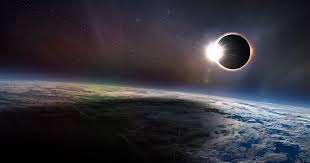A rare total solar eclipse is set to grace the skies of North America on Monday, providing scientists with a unique opportunity to gather invaluable data.
This celestial event will allow for the study of everything from the Sun’s atmosphere to peculiar animal behaviors, and even potential effects on humans.
The timing of this eclipse coincides with the Sun nearing the peak of its 11-year solar cycle, setting the stage for a breathtaking spectacle.
The corona, the Sun’s outermost atmospheric layer, will radiate brilliantly from the Moon’s silhouette along the path of totality, a corridor extending from Mexico to Canada via the United States.
“Total solar eclipses offer incredible scientific opportunities,” said NASA Deputy Administrator Pam Melroy at a press conference earlier this week. NASA, along with other institutions, is prepared for the eclipse and plans to launch “sounding rockets” to study the effects on Earth’s upper atmosphere.
As the Moon passes directly in front of the Sun, blocking it, the elusive corona will be visible in a very special way, according to Melroy. “Things are happening with the corona that we don’t fully understand,” she added.
The heat within the corona intensifies with distance from the Sun’s surface, a counterintuitive phenomenon that baffles scientists.
Solar flares, sudden explosions of energy that release radiation into space, occur in the corona, as do solar prominences, enormous plasma formations that loop out from the Sun’s surface.
Shannon Schmoll, director of the Abrams Planetarium at Michigan State University, explained that during an eclipse, the bottom-most part of the corona, where much of this activity occurs, is more clearly visible than when using specialized instruments to block the central part of the Sun.
This provides a golden opportunity for study.
The total eclipse will also provide scientists with a chance to study changes in the ionosphere, a part of Earth’s upper atmosphere that affects radio waves used for communication and navigation. “Disturbances in this layer can cause issues with GPS and communications,” said Kelly Korreck, the eclipse program manager at NASA headquarters.
NASA’s three sounding rockets will be launched before, during, and just after the eclipse from Virginia to measure these changes.
The significant decrease in sunlight caused by the eclipse should allow researchers to learn more about how light affects the ionosphere, enabling them to better predict potential problematic disruptions.
Startling animal behavior has been noted during eclipses. For instance, giraffes have been seen galloping, while roosters and crickets can start crowing and chirping. Beyond the drop in sunlight, temperatures and wind, conditions to which animals are sensitive, can also decrease significantly during an eclipse.
Andrew Farnsworth, a researcher in ornithology at Cornell University, studies how eclipses affect birds, using weather surveillance radar to detect birds in flight. During the last total solar eclipse visible from the United States in August 2017, scientists observed a decline in the number of animals flying around.
“Eclipses have a special power. They move people to feel a kind of reverence for the beauty of our universe,” NASA Administrator Bill Nelson told reporters. Researchers studied this feeling of awe in 2017, using data from nearly three million users of Twitter, now called X.
Paul Piff, a professor of psychology at the University of California, Irvine, found that those in the so-called “path of totality,” under which the Moon will fully block out the Sun, tended to use the pronoun “we” and express concern about other people. “What we’re finding is that experiences that bring about awe seem to attune people and connect us to one another, to connect us to entities that are larger than ourselves,” Piff said.
About 40 citizen science projects are planned around the eclipse, from using a phone app to register the temperature and cloud cover to recording ambient noise during the event. “We encourage you to help NASA observe the sights and sounds around you,” Nelson said.






















